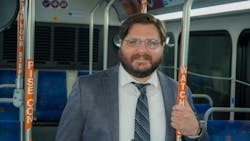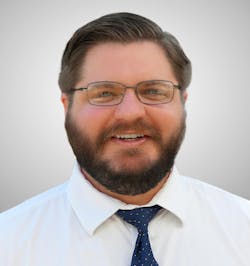One word to describe yourself: Adaptable
Alma Mater: California State University; Los Angeles & University of La Verne
Fast fact about yourself: I am an avid guitar player.
Mike Tobin, director of operations and planning, Livermore Amador Valley Transit Authority (LAVTA), oversees fixed-route and paratransit services in the Tri-Valley region of the East Bay. In this role, he manages the fixed route operations and maintenance contract, paratransit contract, as well as planning, IT and facilities initiatives.
During the past two years at LAVTA, he has played a pivotal role in driving innovation across the agency’s operations. He successfully led the procurement and implementation of a new $122 million operations and maintenance contract and managed the agency’s transition to a new managed IT services provider, initiatives which both significantly improved operational efficiency and service reliability.
Tobin’s 14-year career in public transit began as an intern at Access Services in Los Angeles, where he supported paratransit operations, as well as planning and governmental relations. After earning his bachelor’s degree, he advanced through operations roles at Foothill Transit before becoming senior transit operations analyst at Santa Monica’s Big Blue Bus. Prior to joining LAVTA, he served as deputy transportation officer for the city of Culver City, Calif., where he oversaw fixed-route and paratransit operations, technology infrastructure and the agency’s zero-emission fleet transition, including a pilot of four battery-electric buses.
He has overseen the deployment of several innovative transit technologies, including Swiftly’s real-time passenger prediction platform, Lytx DriveCam, Mobileye, Zonar and a suite of CAD/AVL system upgrades. Tobin is currently managing pilot projects that include a mirrorless camera system and a cloud-based CAD/AVL platform, both aimed at improving fleet safety and operational efficiency. Additionally, he is leading the installation of new routers, which will allow LAVTA to transition to a more reliable and modern cellular network for voice and data communications.
Beyond technology, Tobin has helped shape service delivery through the launch of Wheels in Motion, LAVTA’s network realignment and service enhancement initiative. Informed by robust community outreach, the initiative introduced new routes, improved Bay Area Rapid Transit connectivity and expanded weekend service, resulting in more responsive and equitable transit access for the Tri-Valley region. Tobin updated LAVTA’s Public Transportation Agency Safety Plan and Passenger Code of Conduct.
He holds a project management professional certification and is a graduate of the University of the Pacific’s Transit and Paratransit Management Certificate Program. Tobin has also completed Dale Carnegie Training and is currently attending the Introduction to Operations Planning course facilitated by McCollom Management Consulting, with the goal of honing his planning and scheduling abilities.
In addition to his work at the agency level, Tobin actively participates in the broader transit industry through organizations like the American Public Transportation Association and the California Transit Association (CTA). His involvement includes presenting at conferences, including at the 2024 CTA conference.
He serves on the CTA Operations Committee, participates in Metropolitan Transporation Commission’s Policy Development Working Group and represents his agency on the Bay Area Paratransit Accessibility Committee. Tobin also participated in the 2025 Leadership Pleasanton cohort, a civic engagement program.
Is there a specific experience that led you to where you are today?
My first job in transit was with Access Services in Los Angeles, and the experience had a profound impact on me. I worked in the customer service call center for a time, speaking directly with riders every day. Many of them depended on paratransit services for basic mobility, including getting to medical appointments, jobs or simply visiting family. Hearing their stories firsthand opened my eyes to how essential public transportation is as a lifeline that enables people to lead independent, empowered lives.
That experience instilled in me a deep respect for the human side of transit. It shaped the way I approach every aspect of my work. I carry those conversations with me to this day, and they continue to guide my commitment to helping support transit systems that are equitable, accessible and responsive to the people who rely on them.
What do you enjoy most about your job?
What I enjoy most is twofold. First, it’s the tangible, everyday impact I get to make in the community that I serve. There’s something incredibly rewarding about knowing that the work I do helps people access jobs, education, healthcare and connections with others. Public transit is about more than moving people; it’s about improving lives and being part of that mission gives my work deep meaning.
Second, I genuinely love the people in this industry. I’ve had the privilege of collaborating with some of the smartest, most passionate professionals out there who care deeply about making our communities more equitable and sustainable. Many of them have become lifelong friends and getting to tackle complex, real-world challenges alongside such dedicated colleagues has made this career not just fulfilling, but inspiring.
What’s the most challenging part of your job?
Implementing innovative technologies in environments resistant to change is a constant challenge. I believe in technology’s ability to enhance service delivery and improve the rider experience, but success depends on choosing the right tools, pacing deployment carefully and aligning with broader organizational goals. It also requires building trust, namely, earning buy-in from frontline staff, clearly communicating with stakeholders and ensuring the rider experience improves. Balancing all those moving parts is complex, but when it works, it’s transformative.
What is the accomplishment you’re most proud of and why?
I’m most proud of leading the design, build and deployment of Culver City’s first four battery-electric buses. Environmental sustainability was one of the primary reasons I entered the transit industry, so overseeing a project that directly reduced carbon dioxide emissions in the community I served was incredibly meaningful. It wasn’t just about deploying vehicles; rather, it was about making a tangible impact, aligning values with action and delivering a project that advanced cleaner, more sustainable mobility. That sense of purpose and pride has stayed with me ever since that project.
What is an accomplishment you would like to work towards in your career?
I want to help develop the next generation of transit professionals, both in leadership and on the front lines. That means actively mentoring and developing emerging talent and creating pathways for growth and upwards mobility in the industry. Just as importantly, I also want to focus on making transit operations, especially the role of bus operator, a more attractive, sustainable career by improving quality of life through better compensation, more predictable schedules and supportive work environments. Operators are the heart of transit and supporting them is essential to creating a more resilient future for the transit industry.
What is your best advice/tip/best practice you can share from your area of expertise?
Listen and learn. Practice active listening and approach every situation as a learning opportunity. Whether you’re engaging with frontline staff, riders, elected officials or senior leadership, truly hearing different perspectives helps you grow, make better decisions and build trust and relationships. In this industry, no one person or agency has all the answers, and so staying curious, asking thoughtful questions and being open to new ideas is essential to success and professional growth.
About the Author
Brandon Lewis
Associate Editor
Brandon Lewis is a recent graduate of Kent State University with a bachelor’s degree in journalism. Lewis is a former freelance editorial assistant at Vehicle Service Pros in Endeavor Business Media’s Vehicle Repair Group. Lewis brings his knowledge of web managing, copyediting and SEO practices to Mass Transit magazine as an associate editor. He is also a co-host of the Infrastructure Technology Podcast.


